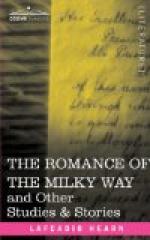VIII. H[’E][:I]K[’E]GAN[`I]
Readers can find in my “Kott[=o]” a paper about the H[’e][:i]k[’e]-Crabs, which have on their upper shells various wrinklings that resemble the outlines of an angry face. At Shimono-s[’e]ki dried specimens of these curious creatures are offered for sale.... The H[’e][:i]k[’e]-Crabs are said to be the transformed angry spirits of the H[’e][:i]k[’e] warriors who perished at Dan-no-ura.
Shiwo-hi ni wa
S[’e][:i]zoro[:e] shit[’e],
H[’e][:i]k[’e]gani
Ukiyo no sama we
Yoko ni niramitsu.
[Marshaled (on the beach)
at the ebb of the tide, the
H[’e][:i]k[’e]-crabs
obliquely glare at the apparition of this
miserable world.[47]]
[Footnote 47: Hi, the third syllable of the first line of the poem, does duty for hi, signifying “ebb,” and for hikata, “dry beach.” S[’e][:i]zoro[:e] is a noun signifying “battle-array”—in the sense of the Roman term acies;—and s[’e][:i]zoro[’e] shit[’e] means “drawn up in battle-array.”]
Saikai ni
Shizumi-nur[’e]domo,
H[’e][:i]k[’e]gani
K[=o]ra no iro mo
Yahari aka-hata.
[Though (the H[’e][:i]k[’e])
long ago sank and perished in
the Western Sea, the H[’e][:i]k[’e]-crabs
still display upon
their upper shells the color
of the Red Standard.[48]]
[Footnote 48: The ensign of the H[’e][:i]k[’e], or Ta[:i]ra clan was red; while that of their rivals, the Genji or Minamot[=o], was white.]
Mak[’e]-ikusa
Munen to mun[’e] ni
Hasami ken;—
Kao mo makka ni
Naru H[’e][:i]k[’e]gani.
[Because of the pain of
defeat, claws have grown on their
breasts, I think;—even
the faces of the H[’e][:i]k[’e]-crabs
have become crimson (with
anger and shame).]
Mikata mina
Oshi-tsubusar[’e]shi
H[’e][:i]k[’e]gani
Ikon we mun[’e] ni
Hasami mochik[’e]ri.
[All the (H[’e][:i]k[’e])
party having been utterly crushed,
claws have grown upon the
breasts of the H[’e][:i]k[’e]-crabs
because of the resentment
in their hearts.[49]]
[Footnote 49: The use of the word hasami in the fifth line is a very good example of keny[=o]gen. There is a noun hasami, meaning the nippers of a crab, or a pair of scissors; and there is a verb hasami, meaning to harbor, to cherish, or to entertain. (Ikon wo hasamu means “to harbor resentment against.”) Reading the word only in connection with those which follow it, we have the phrase hasami mochik[’e]ri, “got claws;” but, reading it with the words preceding, we have the expression ikon wo mun[’e] ni hasami, “resentment in their breasts nourishing.”]




